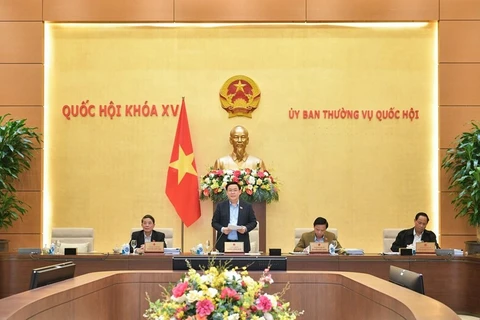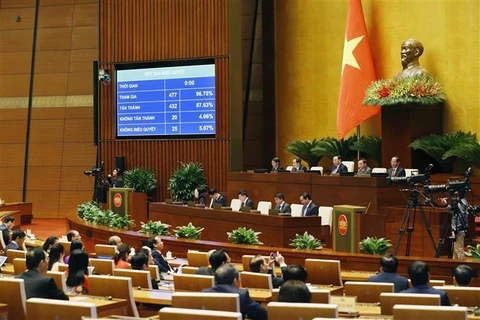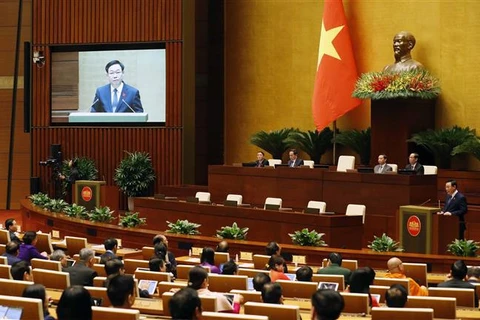Hanoi (VNA) - Standing member of the National Assembly's Economic Committee Phan Duc Hieu recently shared his optimistic outlook on the practical implications of the revised Land Law while talking with the press.
The amended Land Law, which includes hundreds of new provisions, was recently passed by the legislature. It is considered a crucial and complex piece of legislation with far-reaching impacts on socio-economic aspects.
Five major policy groups
Reporter: The amended Land Law has just been passed by the legislature with an approval rate of 87.63%. Some argue that this rate is lower than many other laws. Could you share your thought on this issue?
Phan Duc Hieu: This is a significant bill with profound implications on socio-economic lives, deeply affecting people of all walks of life and business communities. It is also a very difficult and complex bill.
This draft law was meticulously prepared by the NA and its Standing Committee, the Government, and relevant agencies and organisations. It went through multiple stages and was presented to the NA in four sessions and two sessions of full-time deputies, nine official meetings of the NA Standing Committee, with over 12 million opinions from agencies, organisations, experts, scientists and stakeholders. All registered opinions were voiced by deputies and collected by the NA Standing Committee, the Government, and competent agencies for consideration and explanation.
On such a basis, the NA deliberated and voted on it, with an approval rate of 87.636%. This demonstrates caution and meticulousness, as well as the complexity of the Law, and naturally, differing opinions on a complex law are to be expected as normal.
I believe that the NA's approval of the amended Land Law has brought much joy and anticipation among many citizens and voters, as they hope that the law will have a positive effect on practical life.
With a comprehensive volume comprising 260 articles and extensive content, if we were to consider the new points in detail, we could say that the amended Land Law has hundreds of new provisions. However, looking at the essence of the amended Land Law, I believe that from the perspective of the people, businesses and State management agencies, there are five major policy groups.
First, there is a policy group focusing on enhancing the level of protecting the legitimate rights and interests of the people and land users.
Second, it addresses land accessibility for livelihoods, business operations and the State's goal of developing socio-economic infrastructure.
Third, it aims to improve land use efficiency, recognising land not only as a place of residence but also a primary input resource for production and business activities. Therefore, improving land use efficiency, preventing speculation and avoiding wasteful land use are crucial aspects.
Fourth, there are financial issues related to land, such as land valuation, land use fees, and other associated fees. And
Lastly, it concentrates on the effectiveness and efficiency of State land management.
These are remarkable new contents of the revised Land Law which are poised to yield positive outcomes in practice.
Facilitating convenience for citizens, businesses
Reporter: Among the above policy groups, which is the most important, directly impacting citizens and businesses?
Phan Duc Hieu: From the standpoint of the people and businesses, I think there are two very important groups.
The first is related to improving the level of protecting their legitimate rights because land is a production material and a primary input resource.
The amended Land Law introduces many new points from the old one. The first thing to highlight is the expansion of the rights of land users, particularly for Vietnamese citizens residing abroad. This is consistent with the Party and State's policy of treating Vietnamese citizens without discrimination against their residence. I think this policy is not only fair but also pools investment resources into Vietnam for socio-economic development.
The second is that we have many policies targeting ethnic minorities. Having favourable and reasonable mechanisms to support them with land for residence and production, in my opinion, has a much greater impact than just satisfying housing and production needs because they often reside in areas related to national defence and security. And
Third, particularly important in this policy group is the reform of administrative procedures for citizens and businesses. Therefore, the new policies significantly impact land accessibility, especially for enterprises.
For example, in the case of property project transfer, previously both foreign-invested and domestic economic entities had to undergo a sequential and complex process, including land transfer and reclamation. However, the amended Land Law takes a more comprehensive approach, cutting unnecessary procedures. Therefore, it has created more convenience.
Second, in my view, the essence of the amended Land Law lies in effectively institutionalising the Party and State's policy, which advocates for the use of market mechanisms in land access. By relying more on market mechanisms, we can reduce administrative procedures and costs considerably. This is a point that I also expect to stimulate socio-economic activities, especially benefiting businesses.
We can mention a few points. First, we are using market mechanisms more, such as auctioning, bidding, change of land use purpose, capital contribution and business cooperation.
Second, there is consideration for fairness and convenience in accessing land for businesses across all sizes and sectors. For example, in auctions, land cannot be auctioned off for healthcare development because it may lead to real estate development instead. Additionally, small- and medium-sized enterprises (SMEs) cannot compete in auctions against larger ones. The amended Land Law has introduced mechanisms for land recovery and allocation for projects, promoting healthcare activities, and requiring industrial zones to allocate land for SMEs.
These are provisions that I personally highly value. Furthermore, there are provisions regarding the expansion of land toward the sea, acknowledging the potential of maritime economic activities and adding regulations for investment projects involving sea encroachment activities. Land resources allocated for social policies like social housing for workers have undergone significant changes to make market access more convenient and fair.
- Thank you very much!


























